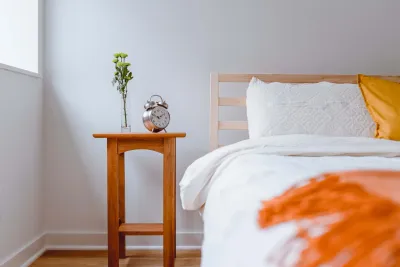What Is Sleep Health & Why It’s Important?
Ana Marie Schick: Resident Sleep Expert and Certified Health Coach • Aug 16, 2022

Key Takeaways
Sleep health is a core pillar of overall wellness, influencing how your body recovers, functions, and performs each day.
- Sleep is as essential to health as nutrition and physical activity, forming the foundation of daily well-being.
- Consistent, high-quality sleep supports immune strength, brain function, heart health, and emotional balance.
- Ongoing sleep disruption is linked to higher risks of conditions such as obesity, diabetes, depression, and cardiovascular disease.
- Strong sleep hygiene—regular schedules, a supportive sleep environment, and stress management—plays a major role in sleep health.
- Sleep technology, including temperature-regulating systems, can help create conditions for deeper, more restorative sleep.
We all know what it’s like to struggle with not sleeping well. We all can relate to having a bad night’s sleep or waking up groggy and sluggish. We all have experienced poor sleep health at some point in our lives.
But what is sleep health, and why is it important?
Sleep Health Defined
According to Daniel J. Buysse, MD, of the Sleep Medicine Institute at the University of Pittsburgh, a meaningful definition of sleep health includes a person’s ability to successfully interact with the demands of their environment.
It also incorporates aspects of sleep that are most clearly associated with physical, mental, and neurobehavioral well-being.
Therefore, sleep health can be defined as,“…a multidimensional pattern of sleep-wakefulness, adapted to individual, social, and environmental demands, that promotes physical and mental well-being.” [1]
Dr. Buysse also points out that good sleep health is characterized by subjective satisfaction, appropriate timing, adequate duration, high efficiency, and sustained alertness during waking hours. [2]
The Importance of Good Sleep Health
Evidence-based research in sleep medicine, public health, primary care, and mental health all point to the quality of sleep as a key factor in overall medical health, mental health, and cognitive function.
In fact, HealthyPeople 2020, a nationwide initiative for health promotion and disease prevention, identified chronic sleep loss as a major public health burden. [3]
Consistent, high-quality sleep has countless benefits, including the following:
- Improving the body’s ability to fight off infection
- Optimizing workplace safety [4]
- Prevention of diabetes
- Weight management. [5]
- Boosting cardiovascular health
- Maximizing performance in work and school [6]
- Prevention of motor vehicle accidents [7]
The American Academy of Sleep Medicine emphasizes sleep as a biological necessity and, therefore, essential to good health and chronic disease prevention. [8]

Sleep Cooler & Feel the Difference
Falling into a deep sleep is linked with cooling your body temperature, and being hot can reduce the likelihood of falling asleep and staying asleep—cool your body with one of our bed cooling systems, the Chilipad.
Breaking Down Sleep Health
There are five different facets or dimensions of sleep that are most relevant to sleep health:
- Duration - Total amount of sleep per 24-hour period
- Continuity/Efficiency - Ease of falling asleep and staying asleep
- Time - Placement of sleep within a 24-hour period
- Alertness/Sleepiness - ability to remain alert during waking hours
- Quality/Sleep Satisfaction - Subjective assessment of “good” or “poor” sleep [9]
Individualized knowledge of these dimensions helps in understanding our strengths and where we might be lacking in sleep health. Chances are, we could all stand to make improvements to one or more of them! Let’s see what sleep experts can teach us about each of these five dimensions.
Read More: What is Heart Rate Variability?
How Long Should You Sleep?
In-depth research reveals that there’s more to healthy sleep than simply the number of hours between hitting the pillow and leaving it. Quality vs. quantity of sleep is critical. This is where the remaining four dimensions of good sleep health come into play.
Just focus less on a set number and more on allowing your body to move naturally into a deep sleep so you wake up feeling rested. If you only get five hours of sleep, make it the best five hours possible.
Continuity and Efficiency
Sleep latency, the amount of time it takes to fall asleep, normally ranges between 20 and 30 minutes. Any longer cuts into effective progression through REM (Rapid Eye-Movement) and non-REM sleep cycles. [10] [11]
Sleep continuity interruptions include:
- Environmental Temperatures That Are Too Warm
- Stress & Anxiety
- Certain Medical Conditions
- Changes to a Person’s Daylight Exposure
Related Blog: How Long Should I Nap to Feel Energized?
The Amount of Sleep Time
Are you a “night owl” or an “early riser?” Optimum sleep times, mealtimes, and periods of maximum alertness are guided by individual chronotypes. Chronotypes can be described as,“…a fancy way of talking about your body clock or circadian rhythm. And it sort of looks at what kind of sleeper you are, [like] a morning person [or] night owl [and] when you should go to sleep. [13] (* para 9)
Good sleep health is particularly challenging if our daily lives go against chronotype. For example, those who experience jet lag or perform shift work or social jet lag, have little leeway in sleep choices. [14] Fortunately, there are numerous ways to find the balance between meeting daily responsibilities and getting proper sleep.
Getting proper sleep is linked with cooling your body temperature. Your body must drop two degrees cooler during the night, and you can make this happen with our Chilipad Dock Pro, or Chilipad Cube Sleep Systems.
Alertness and Sleepiness
The Centers for Disease Control and Prevention (CD) released a study on alertness and sleepiness. According to the CDC, drowsy driving is a mixture of driving and fatigue. It can occur when someone is operating a vehicle and has either not slept enough, has untreated sleep disorders, is on medications, or is a shift-work employee. It can also happen when someone is driving under the influence of alcohol.
Who Are Likely to Drive Drowsy
- Drivers Who Do Not Get Enough Sleep
- Commercial Drivers Who Operate Vehicles
- Shift Workers: People That Work the Night Shift or Long Shifts
- Drivers With Untreated Sleep Disorders Such as Sleep Apnea
- Drivers Who Use Medications That Make Them Sleepy
- Young and Inexperienced Drivers
The CDC encourages drivers to avoid drinking alcohol or taking medications that make people sleepy. It also asks people with sleep disorder symptoms who snore or feel sleepy during the day to talk to a doctor. [15]
Quality and Sleep Satisfaction
Interestingly, sleep health is influenced by the subjective perception of sleep. If we believe we are getting enough sleep, we feel more rested and alert. A fascinating national study of older adults which compared objective measures of actigraphy (a wrist sleep monitor) with individual self-reports made these revelations: [16]
- Many who reported more daytime restfulness had statistically fewer sleep hours.
- Those who reported waking early actually had substantial amounts of sleep. [7]
This understandably prompts the question in all of our minds:
“How do I know if I have healthy sleep?”
- Although the answer can be a bit complex, it’s completely achievable. Effective strategies include any combination of the following:
- Understanding your chronotype
- Getting help from sleep experts, physicians, or other health professionals [18]
- Keeping a daily log of alertness and energy level
Tying it All Together for Excellent Sleep Health
Your roadway to sleep health is unique to you. It’s been carefully handcrafted by genetics, evolution, your environment, and family history.
It’s not always an easy road, but it’s definitely exciting. Your work and exploration will bring unending benefits to medical health, longevity, cognitive and mental function, and overall life satisfaction.
Peer-Reviewed Research References
-
Buysse, D. J.
Sleep Health: Can We Define It? Does It Matter?
SLEEP, 37(1), 9–17, 2014.
Source Type: Peer-Reviewed Conceptual Framework
Key Insight: Establishes sleep health as a multidimensional construct that includes duration, continuity, timing, satisfaction, alertness, and regularity—positioning sleep as a core pillar of overall health.
View Study
-
Ibid.
Source Type: Peer-Reviewed Conceptual Framework
Key Insight: Argues that sleep health is a measurable and actionable public health target with implications for chronic disease prevention, productivity, safety, and quality of life.
-
Office of Disease Prevention and Health Promotion.
Overview: Sleep Health.
Healthy People 2020, February 6, 2022.
Source Type: U.S. Government Public Health Guidance
Key Insight: Identifies sleep health as a national priority and outlines population-level objectives to improve sleep duration, quality, and safety across all age groups.
View Resource
-
Ibid.
Source Type: U.S. Government Public Health Guidance
Key Insight: Highlights associations between insufficient sleep and increased risk of cardiovascular disease, diabetes, depression, workplace errors, and motor vehicle accidents.
-
American Heart Association.
Life’s Essential 8: Sleep Duration.
2022.
Source Type: Cardiovascular Health Framework
Key Insight: Includes sleep duration as one of eight essential components for optimal cardiovascular health, recognizing its role in metabolic, cognitive, and heart health outcomes.
View Resource
-
National Heart, Lung, and Blood Institute (NHLBI).
In Brief: Your Guide to Healthy Sleep.
September 2011.
Source Type: Federal Health Education Resource
Key Insight: Provides foundational guidance on sleep stages, sleep needs, and behavioral strategies that support restorative sleep and long-term health.
-
Hanson, J. A., & Huecker, M. R.
Sleep Deprivation.
StatPearls Publishing, 2022.
Source Type: Clinical Medical Reference
Key Insight: Reviews causes, symptoms, and consequences of sleep deprivation, including impaired cognition, immune dysfunction, metabolic dysregulation, and increased accident risk.
View Study
-
Ramar, K., Malhotra, R. K., Carden, K. A., et al.
Sleep Is Essential to Health: An American Academy of Sleep Medicine Position Statement.
Journal of Clinical Sleep Medicine, 17(10), 2115–2119, 2021.
Source Type: Professional Medical Position Statement
Key Insight: Declares sleep a biological necessity and urges healthcare systems, employers, and policymakers to prioritize sleep health as a public health imperative.
-
Ibid.
Source Type: Professional Medical Position Statement
Key Insight: Emphasizes screening for sleep disorders and addressing sleep inequities as part of preventive and clinical care.
-
Holland, K.
What Do You Know About Healthy Sleep?
Healthline, July 3, 2019.
Source Type: Consumer Health Education
Key Insight: Translates evidence-based sleep science into practical guidance for improving sleep habits and recognizing signs of poor sleep health.
View Resource
-
Centers for Disease Control and Prevention (CDC).
Drowsy Driving: Asleep at the Wheel.
October 28, 2021.
Source Type: Public Safety & Health Guidance
Key Insight: Demonstrates that sleep deprivation impairs reaction time and decision-making, significantly increasing crash risk comparable to alcohol impairment.
-
Chen, J., Waite, L., Kurina, L. M., et al.
Insomnia Symptoms and Actigraph-Estimated Sleep Characteristics in Older Adults.
Journal of Gerontology: Biological Sciences, 70(2), 185–192, 2015.
Source Type: Population-Based Sleep Study
Key Insight: Identifies strong associations between insomnia symptoms and objectively measured sleep disruption in a nationally representative older adult population.
-
Ibid.
Source Type: Population-Based Sleep Study
Key Insight: Reinforces that chronic sleep disruption contributes to declining physical health, cognitive performance, and functional independence with age.









